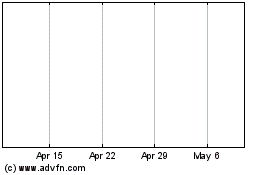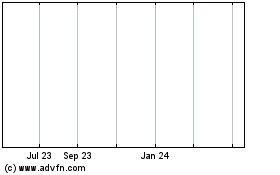By Gregor Stuart Hunter
This article is being republished as part of our daily
reproduction of WSJ.com articles that also appeared in the U.S.
print edition of The Wall Street Journal (August 25, 2017).
For years, tech stocks in Asia have risen and fallen by the
release cycles of Apple Inc.'s iPhone as component producers gear
up to supply new versions. Now, a new type of product is creating a
similar buzz among investors in the region.
Smart speakers -- voice-activated, internet-connected devices
such as Amazon.com Inc.'s Echo -- have scored with consumers by
allowing them to make purchases without picking up a phone thanks
to onboard assistants like Amazon's Alexa.
Apple, Alphabet Inc.'s Google, Samsung Electronics Co. and
several Chinese competitors have followed Amazon into the market in
search of the next big trend in consumer electronics. That has
added to demand for components like semiconductors, speaker modules
and motion sensors coming from Asian suppliers, contributing to a
supply crunch and lifting margins for those producers.
Smart speakers are just taking off, but will have a "smartphone
moment" at which point they become ubiquitous, said Oliver Lee,
investment director at Old Mutual Global Investors, which manages
$37 billion in assets.
Sales are growing quickly. Some 10.7 million Amazon customers in
the U.S. owned an Echo device at the end of the first quarter, up
from three million a year earlier, according to research firm
Consumer Intelligence Research Partners LLC.
The Echo was first offered to Amazon Prime customers in the U.S.
in 2014. Last year, the U.S. company began selling its speakers in
Europe.
Market-research firm Gartner estimates spending on smart
speakers will total $3.5 billion globally by 2021, compared with
$360 million in 2015.
"Amazon Echo, Google Home and Apple HomePod are going to be much
more prevalent in the home over the next three to four years," Mr.
Lee said. "We're in the early stage for this rollout, and we don't
think it's fully priced into the stocks."
Asian tech companies are racing to grab market share. Alibaba
Group Holding Ltd. has released a digital assistant similar to
Amazon's Echo, while Samsung is also developing a voice-activated
speaker. Baidu Inc. launched a home-control robot called "Little
Fish" in April and Alibaba e-commerce rival JD.com Inc. sells a
smart speaker in the Chinese market called Dingdong.
The sudden popularity of these devices has been a boon to
component suppliers such as Taiwan's WIN Semiconductors Corp.,
whose share price has almost doubled this year. Investors are
piling into the company, which trades at a discount to highflying
tech stocks like Amazon. Data from FactSet show $104 million in new
investment from fund managers including Fidelity International
during the last six months.
Old Mutual has snapped up shares in Hong Kong-listed Hua Hong
Semiconductor Ltd., whose stock has risen 20% this year.
Fund managers including AllianceBernstein LP and Guggenheim
Investments have increased their holdings in the company by a total
of $82 million in the last six months, according to FactSet.
Another beneficiary is Primax Electronics Ltd., a maker of
speaker modules for Amazon and Google devices whose shares are up
59% this year. Fund managers, including Lazard Asset Management and
J.O. Hambro Capital Management Ltd., have invested $95 million in
Primax shares this year, according to FactSet.
The component makers' shares are a comparative bargain.
Amazon trades with a multiple of 147 times next year's estimated
earnings, Google parent Alphabet at 25 times next year's earnings,
Alibaba at 31 times and Baidu at 28 times. Meanwhile, WIN
Semiconductors trades at a multiple of 18.4, Primax at 12.2 times
and Hua Hong at 9.8.
Still, smart speakers are in their infancy. In contrast, the
smartphone industry is expected to generate spending of $400
billion this year, a decade after Steve Jobs introduced the iPhone.
In the first quarter, Samsung shipped 79 million smartphones while
Apple sold 52 million iPhones, according to Gartner.
But the technology powering the voice-commanded assistants like
Alexa represents a rich opportunity for investors.
Demand for smart speakers is expected to help spur what Nomura
describes as an "unprecedented super cycle" for semiconductors, in
particular dynamic random access memory, known as DRAM. The chips
are used for servers powering cloud computing and artificial
intelligence, which underpins speech-recognition software.
Stocks expected to benefit from the added demand include Samsung
Electronics -- which Nomura expects will surpass Intel as the
biggest semiconductor company -- and South Korean rival SK Hynix
Inc., shares of which have more than doubled in value during the
past year.
Fund managers say the rally has further to go. Hardware makers
in South Korea and Taiwan that sell components for these products
are in a strong position to generate higher margins for the
foreseeable future, said Arthur Kwong, head of Asia Pacific
equities at BNP Paribas Investment Partners, which manages EUR580
billion.
The MSCI Korea index is up 21% this year, while MSCI Taiwan has
gained 13%. Both are ahead of the S&P 500, which has gained
9.5%.
"There's quite a high barrier to entry," Mr. Kwong said. "A lot
of Chinese companies are trying to move into this space, and it'll
take a long time for them to develop the required technology."
Write to Gregor Stuart Hunter at gregor.hunter@wsj.com
(END) Dow Jones Newswires
August 25, 2017 02:47 ET (06:47 GMT)
Copyright (c) 2017 Dow Jones & Company, Inc.
Samsung Electronics (PK) (USOTC:SSNHZ)
Historical Stock Chart
From Mar 2024 to Apr 2024

Samsung Electronics (PK) (USOTC:SSNHZ)
Historical Stock Chart
From Apr 2023 to Apr 2024
